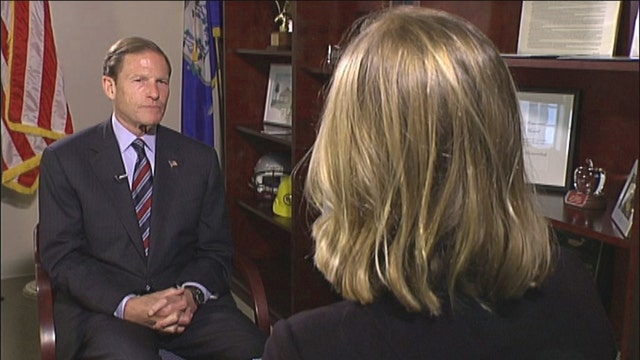Forgotten Americans: Can Anyone Rescue the Long-Term Unemployed?
Long-term unemployment is a phrase that has been repeated so often in the past few years that it is now part of the vernacular of the Great Recession -- and rightly so.
The statistics are startling and show how systemic the problem is: almost 5 million people out of work long-term; almost half 50 years old or older; and only about 10% of those out of work for more than a year find jobs each month. The harsh truth is that as each day passes for long-term unemployed Americans, the bleaker are the chances that they will ever get back in the workforce.
In Washington, legislation has been proposed to help this group, but nothing has been passed. And while the press has covered the issue extensively, the national media’s grim reporting has had little impact. If you’re stranded on “unemployment island,” as one long-term unemployed person calls it, the chances of being rescued are depressingly slim.
“It’s a tough game and a really vicious cycle,” said Jami Klubek, who was operations manager for a 250-person call center in West Hartford, Conn., for 10 years before being laid off in 2010.
Klubek is one of the millions of faces of long-term unemployment. Her home is likely to be foreclosed on, and she is currently on food stamps. She said she sends out 40 resumes a day and worries that part of the reason she hasn’t been hired is because she doesn’t have a college degree (though, according to the numbers, the pervasiveness of long-term unemployment cuts equally across gender, race and education).
“The only experience I have is my workplace experience, which I figured would be worth something to somebody,” she said.
Feeling worth something -- or not feeling worth anything -- is a recurring theme at Platform to Employment, a Connecticut-based program that helps get the long-term unemployed back on their feet through retraining and paid internships that have the potential to lead to full-time employment.
“So often I hear that unemployment is diminishing, that the numbers are getting better. But these folks are choosing to look the other way and are ignoring the deprivation of opportunity that is out there,” said Joe Carbone, the founder of Platform to Employment.
On Capitol Hill, Connecticut Senator Richard Blumenthal has been one of the most vocal proponents of rescuing the long-term unemployed. He has visited The Workplace, the Bridgeport (Conn.) non-profit that administers The Platform to Employment program, and has introduced legislation that mirrors the privately funded program.
“The fact of long-term unemployment in the numbers we have seen, the magnitude that is so dramatic, is really a call to action for the country,” said Blumenthal. “It is every bit as exigent in its threat to our security–our economic security–as any problem we face today, and that’s why training and skills are so vital.”
“[Long-term unemployment] is a total human disaster,” said Heidi Shierholz, an economist at the Economic Policy Institute. “Letting this huge group of people languish, it’s a…glaring symptom of needing to get jobs back more broadly.”
In the past two years, Blumenthal has sponsored measures, including the Pathways Back to Work bill, which would provide opportunities similar to those offered by Platform to Employment. The legislation has gone nowhere.
“The obstacles are partisan gridlock,” said Blumenthal. “It’s so frustrating to me, maybe the most frustrating part of my job. The paralysis that comes from partisan fighting has blocked many of the measures that I and others have supported to put people back to work, to provide pathways back to work.”
According to the Bureau of Labor Statistics, the number of people out of work for fewer than five weeks has returned to almost the same level as in 2007. But for those who have been out of work for more than 27 weeks—the point that tips them into the long-term unemployed category--the number is 257% higher than 2007.
“If it wasn’t for CHFA [Connecticut Housing Finance Authority] and their emergency mortgage program, we would have lost the house. I've spent down my 401k and my IRA and all that kind of stuff, and the house is next to go….” said one man who wanted to remain nameless since being classified as long-term unemployed could hurt his chances of employment. “So it’s been frustrating. It’s been demeaning. I’ve never been unemployed before, and I am just very surprised at the length of time and the response--or the lack of response.”
"If we don’t give them the resources they need to try to get back, we are complicit in this tragic journey they are on.”
Carbone’s Platform to Employment, or P2E, is responding by rolling out programs in 10 cities this year, including Chicago, Boston and San Francisco. The program has big-name sponsors such as AARP and Wal-Mart, and while it’s expanding, there are more than a thousand applicants for each five-week session and only 20-25 coveted spots available for people desperate to find work and struggling just to stay above water.
Bob Greeney, 55, knows what it’s like to be on what he calls “unemployment island.”
“I was out of work for so long and it was almost like, professionally, I was adrift at sea and was kind of just hanging…onto a plank.”
The former sports writer of 29 years was accepted into Platform to Employment after three years out of work. That in itself gave him hope, said Greeney.
“I had to go three days a week for five weeks, but I looked forward to those days,” said Greeney. “I think they threw me that professional-life preserver and saved me. And they really did save me because I wasn’t finding anything on my own.”
Greeney, who with the help of P2E landed a job at the Connecticut-New York rail service Metro North, said he feels as though his generation is being sidelined.
“‘Too young to retire, too old to get hired.’ I certainly feel like there is some of that going on,” he said.
“There are a lot of folks around this nation that would, if they had their druthers, hope that [the long-term unemployed] would just fall into the abyss,” said Carbone. “They think they are scarred, their skills are dulled, and there is a perception that something is wrong with them since they’ve been out of work so long, but it’s not true.”
The silent desperation that envelopes so many of those out of work doesn’t seem to be registering with the public.
A new Rasmussen survey shows only 10% of Americans think the government should hire long-term unemployed people, and 34% think the government should do nothing at all for people who have been out of work for an extended period of time (that’s down from a high of 39% in December).
Carbone said the lack of empathy is shameful.
“They are victims. They are victims during the worst recession since the Great Depression, and they are no different than victims of a natural disaster” he said. “…If we don’t give them the resources they need to try to get back, we are complicit in this tragic journey they are on.”
Senator Blumenthal agrees that in most cases, long-term unemployed are out of work by no fault of their own.
“There needs to be a renewed consciousness about our obligation as a country to the long-term unemployed….” said Blumenthal. “[They should] never give up because there will be skill training. Our economy needs it. We have an obligation to provide it. It’s in our self-interest to do it, and it will happen.”
In the meantime, millions wait anxiously for a shot at becoming employed again.
“Sometimes I had these dreams where I had a job and as weird as the dream may be and as weird as the job may be, I had a job,” recalled Greeney. “And then I woke up and I was like, ‘No that was just a dream.’ It was a depressing reality to wake up to, and no matter how many times I kept telling myself ‘You can’t stay down, you need to get up and fight,’ honestly, there was a lot of despair.”





















